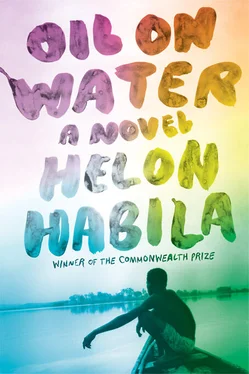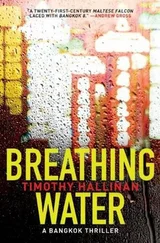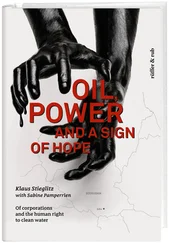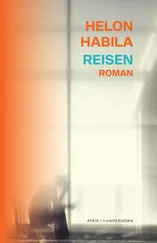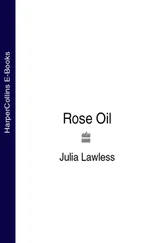We headed south. I turned and looked back at the receding waterfront and the swath of white foamy furrow following in the boat’s wake, curving when we curved, a soothing and mesmerizing sight that for a moment took my mind off whatever awaited us at our rendezvous. Soon we were out of the open water and into the narrow channels that were like valleys bordered on both sides by dense palm plants or sometimes by unexpected cliff faces. Here the going became slow, and after a few hours the city lay far away behind us. There were no people or houses to be seen on either bank, only birds jumping out of the tall thin trees and flying away in a flutter of wings and leaves as we approached. Even the Lagos journalists had stopped their loud, self-important whisperings and were listening to the increasingly desperate attempt by our guide to make radio contact with the kidnappers. When we asked him what was going on, he admitted he had no idea where we were going; he had been instructed to head for a general direction and at a certain point to call a particular frequency on his radio to be guided in. Now we seemed to be going about in circles, and we could hear the rising frustration in his voice as he screamed into the radio while maneuvering the wheel with one hand. No one was responding on the other end.
— I am here now, I need a contact. Over!
— What’s going on?
Nkem, the reporter from the Globe , stood up and went closer to the guide, shouting his question into the wind and water spray. The guide waved the radio over his head, as if aiming to throw it into the water, or at Nkem. The channel had become narrower and by now I wasn’t sure if he knew exactly where he was. I knew the general geography of this area, and I knew how confusing and indistinguishable from one another the interconnected rivers and creeks could be, which was why, I was sure, the militants had chosen it for this meeting. The waters were inconstant, and could change from the clearest, friendliest blue to a turbid, unknowable gray in a minute; every tree on the banks and every turning looked like the one before it. We had been circling for about half an hour now and still we had not made contact. We made a turn and suddenly we were in the open water again. I could see the relief on the journalists’ faces: better to be here, where we could see for miles ahead, and away from the hot, claustrophobic mangroves and the ominous swamps that had seemed to be closing in, bearing down on the boat. We went fast and straight for about thirty minutes and suddenly we could see a chain of islands in the distance ahead of us: the tall oil palm trees were like flags waving us in. We passed the first island and as we approached the second one we saw a fire burning on the beach, right by the water. At first we took it for some kind of beacon signal meant for us, but, as we got nearer and could see past the trees, more fires appeared, and they were random and out of control. The whole island was aflame. The journalists stood up one after the other, holding the sides of the boat for balance, trying to look beyond the trees on the beach.
A wooden boat was responsible for the fire on the beach; it was broken to bits, probably from a direct hit by a rocket. Inland, the smoke rose like a tornado into the sky, high over the savaged, seared trees. Our guide circled around the burning boat, the sweat running down his egg-clean head and into his shirt, and he looked uncertain as to what to do next.
— This doesn’t look good.
He turned to us, his expression half apologetic, half puzzled, uncomprehending. He shouted again into his ineffectual radio, but only static, then silence, greeted his effort.
— Can we go down? We must take some pictures.
Nkem was already clicking away. The others also took out their cameras and started jumping into the knee-high water. I was impressed when I saw the Lagos reporters also jump into the water, suits, ties, soft shoes and all. I hopped into the water and waited for Zaq, who was elaborately folding up his trousers before getting down. He took no pictures; instead he made notes in a tattered notebook as he walked around, raising his legs high over the wet undergrowth, sweating, breathing hard through his mouth. I stayed close to him, observing him as I took pictures.
— You don’t have a camera.
He shrugged and said nothing.
— So what do you think happened?
— This thing is so uncomfortable.
He took off his cumbersome life jacket, which we had all been advised to wear but which only Zaq had actually worn, pulling at the straps impatiently, turning a full circle like a dog chasing its tail, all the while cursing. When I repeated my question he turned his puffy, bloodshot eyes to me and shrugged again.
— An ambush, obviously. Someone must have informed the soldiers about this meeting.
— You mean, someone in the kidnappers’ camp?
— Maybe. But certainly someone who knew where and when.
The island looked like a midway stop where traders met to buy and sell, and travelers picked up supplies, rather than an actual village. Now it was deserted: the people, with their chickens and goats and pots and pans, must have escaped rippleless down the river in their dugout canoes after the first shot was fired. We moved inward gradually, pushing aside wet leaves and slimy tendrils, looking at the signs of carnage. Trees lay on the ground, cut in half, dripping vital sap. The smell of burning hung in the air. In the center of a compound a hut had been hit square on its conical roof, causing the thatch to cave in, and now the grass and the rafters all lay in a big pile of ash in the middle of the hut. Zaq was kneeling in the bush behind a hut, talking to the guide, pointing at something in his hand, and when I joined them I saw that he held a spent cartridge.
— What kind of gun would you say?
The guide took the cartridge from Zaq and tossed it up in the air and caught it again. He seemed happy to find something he could be authoritative about.
— This is a seven-point-six-two-millimeter-by-thirty-nine-millimeter shell, fired from an AK-47, most likely. The militants use it a lot.
— So there was definitely a gunfight?
— Not much of a fight, obviously. They didn’t know what hit them. They were taken by surprise by a gun helicopter, or more likely a gunboat. The boat on the beach must have been the first to go, and then the huts.
One of the men gave a shout from behind a tree, and when we went to him we found the journalists in an excited huddle, cameras flashing. A body in a torn blue shirt. It was half covered by bamboo leaves so that the torn stomach was only partially visible, but even that was too much. Undigested food mixed with blood covered the grass around the corpse, flies hovered and descended, oblivious to the clicking cameras and the sound of retching going on all around. The face was squeezed in a grimace of pain, the mouth open in a voiceless howl; he must have seen the gun raised and pointed at him just before the bullet ripped into him. He looked young, not more than twenty. There was a trail of blood that started from the body and disappeared into the grass, indicating how he must have dragged himself after being hit, only to collapse where he now lay. Not far from him, two more bodies lay in a bush, bloody, broken and twisted. I moved away from the group and faced the smooth rippling surface of the water visible in the distance; I took a deep breath. Zaq was bent over in a bush not far from me, retching his guts out. He finished and stood up, his face wet with sweat, wiping the vomit from his mouth with a white handkerchief. He saw me looking at him and managed a weary smile. He lifted his hand weakly and pointed toward the boat.
Zaq was facing mein the boat, raising a hand to protect his puffy face against the wind that would suddenly surge, then subside over the water. From behind the trees we could hear the excited voices of the reporters as they took more pictures. I could imagine them jostling each other, changing positions, trying to get a better and an even better shot of the dead bodies. Zaq was sitting on the same seat he had arrived in, but this time he was leaning weakly against the side of the boat, taking deep gulps of air, still recovering from his retching fit. He had taken out a whiskey flask from his pocket and was sipping from it. I sat facing him, draining the water from my shoes. Zaq grew suddenly talkative, perhaps a nervous reaction to the gruesome spectacle we had just witnessed. The waves gently raised and lowered the boat, the motion calming my frayed nerves. He lit a cigarette and offered me one. I didn’t smoke, but I took one anyway. He blew smoke into the air.
Читать дальше
